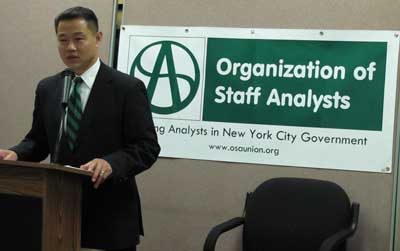November 21, 2011
By Marc Bussanich, LaborPress City Reporter
Comptroller John Liu visited the offices of the Organization of Staff Analysts (OSA) to explain to union members the changes to the public sector pension system that Liu announced with Mayor Bloomberg and several union heads three weeks ago. Bob Croghan, OSA’s president, expects the proposed changes will be the main topic of discussion at the next Municipal Labor Coalition (MLC) meeting, especially as some of the city’s big public unions were not invited to the original announcement.
Liu told the OSA staffers that the proposal calls for the establishment of a new in-house pension board that will ultimately save the city “$300 to $400 million in fees” currently paid to outside investment experts.
Liu said the proposal makes sense because it’ll reduce costs and increase returns. He mentioned that a report released in the spring showed that city public pension costs ballooned to $8 billion because “the market had the worst return performance in the past decade.”
In contrast, he cited the changes some cities across the country and the Canadian province of Ontario (which revamped its system 20 years ago) made to its public sector pension system resulted in returns of 1 to 3 percent. “Just a 1 percent return on the city’s $120 billion public pension funds nets $1.2 billion,” said Liu.
Liu explained while other municipalities have made governance changes to their public pensions, the City’s governance hasn’t changed in 70 years. Currently, there are five Public Pension Funds, each financially independent and with its own board of trustees making their own investment decisions. “We want to streamline the process to prevent essentially a decision being replicated five times,” said Liu.
But Liu acknowledged that it wouldn’t be easy making the changes because not every director overseeing the current system will be on the new central investment decision-making body. Also, since Liu and the Mayor made the announcement, he said a “big sticking point” among the public unions is what will be the new board’s makeup.
Liu noted while the proposal to lower pension costs interested Mayor Bloomberg, the Mayor has said that the proposed changes is “just one way to reduce the city’s pension costs.” When asked by an OSA staffer about the potential downside to the proposal, Liu responded, “The downside is five separate investment boards continue to make the same investment decisions.”
Michael Palladino, President of the Detectives Endowment Association, told LaborPress, “As a trustee and fiduciary, I have an obligation to listen to any proposal that will reduce pension costs and improve asset performance, while simultaneously maintaining my members’ current performance levels.”
Palladino emphasized that “labor has simply agreed to explore the idea….We are a long way from changes being implemented, as critical details still need to be clarified.”
In an e-mail, Steve Cassidy, President of Uniformed Firefighters Association, wrote, “We’ve been encouraging the city to develop a strategic plan for the pension investments that allows it to enhance investment returns for beneficiaries and be much more responsive to changes occurring in the global financial marketplace.”



